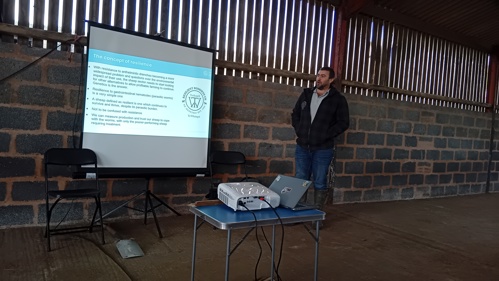



Four farmers have teamed up with Farm Carbon Toolkit to test diverse leys and cover crops which improve the health and resilience of lamb production. This field lab will focus on testing a bespoke chicory-rich mixture for lamb weaning, with the aim of reducing the need for anthelmintics and enhancing growth rates.
The field lab is split across two counties, with two farm trials taking place in Cornwall and funded through the Community Lottery Funded Farm Net Zero Project, and another two on-farm trials in Devon which are funded separately.
Seeds for the trial have been given by DLF Seeds.
Click on the brown banner above for latest activity and other information
Weaning shock causes physiological stress and can cause a sudden increase in worm burden in lambs. This effect can be offset by plant chemicals such as tannins, but also by enhanced forage protein content. Research suggests that higher tannin levels which commonly occur species such as trefoil and plantain also reduce faecal egg counts. Chicory is also well known to reduce intestinal worm burden. Forage legumes are central to providing crude protein, and white clover is the commonly used species for this purpose in leys but not in cover crops. Therefore, in contrast to a brassica-based control cover crop, a protein and tannin-rich mixture will potentially reduce worm burden at weaning shock.
The chicory-rich ley used in this field lab has the potential to:
To examine the effect of a protein rich cover crop, each farm will choose one field to split in half:
Three of the farms will also test the use of a chicory rich herbal ley, choosing another field to split in half:
The leys will be established in spring 2024 and ready to graze at the time of weaning. The fields will be strip grazed by the weaned ewe lambs using a strip-based system, with daily movement of livestock.
The following assessments will take place:
This trial has finished and the final report can be found in the 'results and reports' section of the webpage by clicking on the brown banner above.
At the end of the field lab we held an event at Higher Thornton Farm, kindly hosted by Chris Berry, to share the experiences and results of the trial. for more information see the news update:
Knowledge hub article summarising the trial results and event discussions

Spring/summer 2022
Autumn 2023
April-May 2024
June 2024
June 2024
June-July 2024
July 2024
August 2024
October 2024
December 2024

Trifolium Services
Southwest England
Hannah Jones has previously coordinated and carried out research projects spanning herbal leys, arable systems, cover crops and field vegetables. Her role has been to coordinate farm-based trials by working closely with farmers and agricultural businesses to optimise the impact and applicability of the research. She has a PhD in plant pathology from Oxford University, a degree in plant sciences from Birmingham University, a Masters in postgraduate teaching from the University of Reading, and is FACTS qualified.

Farm Carbon Toolkit
Devon/Cornwall border
